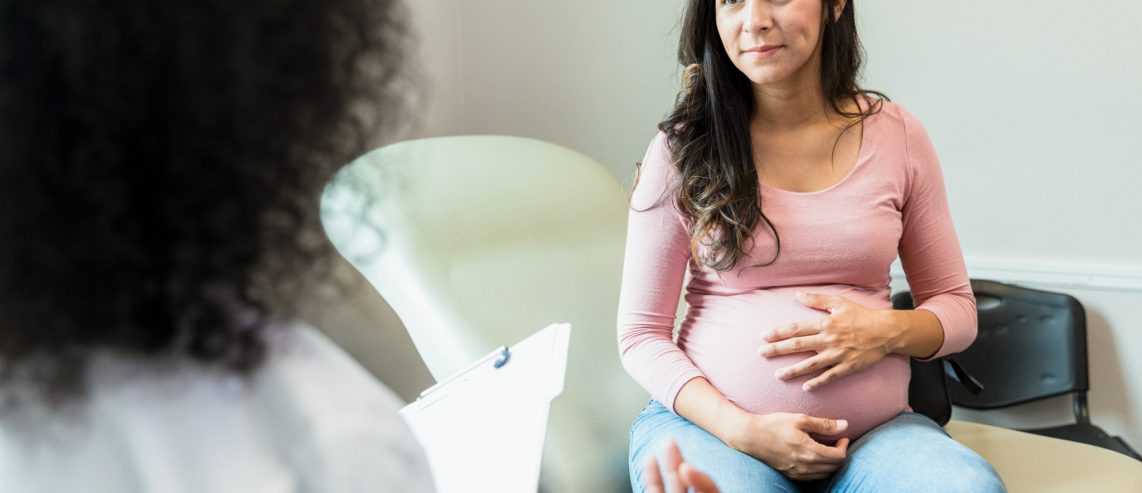Uterine fibroids are noncancerous growths in the uterus. Doctors often diagnose them in women of reproductive age. Many then wonder, can I get pregnant with uterine fibroids?
Sometimes, fibroids can affect fertility and pregnancy. But the good news is that many people can conceive and have a successful pregnancy with fibroids. Keep reading to learn about uterine fibroids and how they may affect fertility.
What Are Uterine Fibroids?
Uterine fibroids are the most common noncancerous tumor in women. Up to 80% of women have fibroids by age 50. That’s according to the U.S. Department of Health and Human Services (HHS).
Fibroids grow from the muscle tissue of your uterus, but their location can vary.
- Intramural fibroids grow within the muscle of your uterine wall.
- Submucosal fibroids grow into your uterus.
- Subserosal fibroids grow on the outside of your uterus.
Anyone can get fibroids, but these factors raise your risk:
- Age. Fibroids are more likely after 30 and until menopause, according to the HHS. They usually shrink after menopause.
- African-American ethnicity. Fibroids arise more frequently in Black women than in white women.
- Diet. A diet high in meat raises the risk, while eating more green vegetables may reduce your risk.
- Family history. Doctors believe your genes play a role in fibroid growth.
- Obesity. Women who are overweight have two to three times higher risk than average.
You might not know you have fibroids because they’re often small and don’t cause symptoms. But if they grow large, or you have many uterine fibroids, they can cause these symptoms:
- An enlarged abdomen.
- Frequent urination if fibroids press on your bladder.
- Heavy menstrual bleeding.
- Lower back pain.
- Pain during sex.
- Pain or heaviness in your pelvic area (lower abdomen).
Doctors can often see or feel fibroids during a pelvic exam. If they suspect fibroids, they can do imaging tests like a CT scan or ultrasound to confirm a diagnosis.
Uterine fibroids are rarely cancerous. They also don’t raise your risk of getting cancer in your uterus.
Never Miss a Beat!
Subscribe to Our HealthBeat Newsletter!
Thank you for subscribing!
You can now select the specific newsletters you'd like to receive.
You are already subscribed.
Subscribe to more newsletters in our email preference center.
Sorry, an error occurred. Please try again later.
Get Healthy Tips Sent to Your Phone!
Can Uterine Fibroids Affect Fertility?
Most people with fibroids can conceive and have a healthy pregnancy. Fibroids only cause infertility in about 2 to 3% of women, according to a review in the journal Diagnostics. Doctors usually first explore other reasons for infertility.
The type, size, and number of fibroids you have can all impact your fertility. Sometimes, they make it harder to get pregnant or raise your risk of a miscarriage. If fibroids may affect fertility, treatments to remove or shrink them can often help.
Submucosal fibroids have the biggest impact since they grow into your uterus. These fibroids can make it hard to get pregnant or maintain a pregnancy. Removing them can help fertility.
Subserosal fibroids that grow outside your uterus. Doctors aren’t sure if fibroids that grow within the muscle wall affect fertility or pregnancy. Your fertility doctor will determine the best course of treatment.
Treatment Options for Uterine Fibroids
You don’t have to treat fibroids unless your symptoms affect your quality of life. But you should talk to your doctor if they’re bothersome or if you’re considering pregnancy.
They can determine the location, size, and number of fibroids. They’ll tell you whether they will grow or affect pregnancy.
If symptoms are severe or your doctor thinks fibroids may affect fertility or pregnancy, they can advise you on the best treatment. There are surgical treatment options that preserve fertility.
Myomectomy is a minimally invasive surgery. A surgeon removes fibroids while leaving your uterus intact.
With a myomectomy, the fibroid removed won’t return. But new ones can still grow and cause problems.
There is also a risk of uterine scarring, which can impact fertility. Myomectomy also has a higher chance of needing a Cesarean delivery (c-section) if you get pregnant.
Your doctor may also suggest radiofrequency ablation as a treatment option. This new procedure uses heat to destroy fibroid tissue.
This heat doesn’t harm the surrounding normal uterine tissue. The fibroids shrink in size, but they may grow back in time.
These fibroid treatments improve the odds of a healthy pregnancy for many women.
Fibroid Effects on Pregnancy
Whether you need treatment or not, most people with fibroids have normal, healthy pregnancies. But there is a higher than average risk of these pregnancy complications:
- You may have a breech baby. This means your baby is lying feet or bottom first, which is not the best position for a vaginal delivery.
- You may have a placental abruption. That’s when the placenta breaks away from your uterine wall before delivery. It prevents your baby from getting oxygen and can cause dangerous heavy bleeding.
- You may need a Cesarean delivery. The risk of a c-section is six times higher when you have fibroids.
- Your baby might come early.
Fibroids can grow larger during pregnancy, increasing your risk of these complications. It’s vital to go to all of your pregnancy visits. They can monitor you and your baby closely and watch for problems.
Tips for a Successful Pregnancy With Fibroids
A healthy diet and lifestyle are essential for anyone considering pregnancy. It’s even more vital if you have fibroids.
Although doctors aren’t sure what causes fibroids to grow. Doctors do know that raised estrogen and progesterone levels play a role.
Eating well and living a healthy lifestyle can help balance hormones. This can also possibly improve your chances of getting pregnant. And, of course, healthy habits contribute to a healthy pregnancy.
- Aim for at least five to seven servings of colorful fruits and vegetables daily. Eat lots of leafy green vegetables.
- Cut back on red meat and processed meats. These include bacon, sausage, and hot dogs. Choose poultry, fish, beans, eggs, Greek yogurt, or nut butter for protein instead.
- Eat fewer carbohydrate-rich foods with added sugar. Choose fiber foods like oats, whole grains, nuts, and seeds.
- Aim for at least 30 minutes of brisk exercise most days of the week.
- Limit alcohol and sugar-sweetened beverages. Drink green tea, which some studies show may help shrink fibroids.
- Maintain a healthy weight. Excess body fat raises estrogen levels.
- Watch out for endocrine-disrupting chemicals. These are in plastic bottles and food containers, pesticides, cosmetics, and products with flame retardants. Some research suggests exposure to these chemicals promotes fibroid growth.
Although uterine fibroids are common and often don’t cause problems, talk to your doctor if you plan a family. They can help with treatments and strategies for a healthy pregnancy and beyond.
Sources
About UPMC Magee-Womens
Built upon our flagship, UPMC Magee-Womens Hospital in Pittsburgh, and its century-plus history of providing high-quality medical care for people at all stages of life, UPMC Magee-Womens is nationally renowned for its outstanding care for women and their families.
Our Magee-Womens network – from women’s imaging centers and specialty care to outpatient and hospital-based services – provides care throughout Pennsylvania, so the help you need is always close to home. More than 25,000 babies are born at our network hospitals each year, with 10,000 of those babies born at UPMC Magee in Pittsburgh, home to one of the largest NICUs in the country. The Department of Health and Human Services recognizes Magee in Pittsburgh as a National Center of Excellence in Women’s Health; U.S. News & World Report ranks Magee nationally in gynecology. The Magee-Womens Research Institute was the first and is the largest research institute in the U.S. devoted exclusively to women’s health and reproductive biology, with locations in Pittsburgh and Erie.

